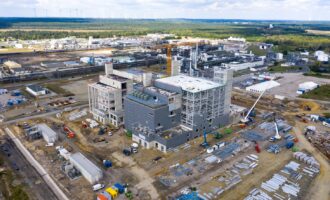
Cathay Pacific to use 10% sustainable aviation fuel by 2030
Hong Kong-based Cathay Pacific Airways, which is celebrating its 75th anniversary this year, reaffirmed its commitment to reach net-zero carbon emissions by 2050 by pledging to use sustainable aviation fuel (SAF) for 10% of its total fuel consumption by 2030.
Cathay Pacific has made pioneering efforts in supporting the development of sustainable aviation fuel for more than a decade. In 2014, it was the first airline investor in Fulcrum BioEnergy, from which the airline has already committed to purchasing 1.1 million tonnes of SAF over 10 years, which will cover around 2% of its pre-covid-19 fuel requirements on an annual basis. Cathay Pacific expects to begin taking delivery of sustainable aviation fuel produced by Fulcrum BioEnergy, and using it on a wider basis for its flights departing the U.S. from 2024 onwards, when Fulcrum can scale up its SAF production.
The airline was also the first to partner with Airbus to use SAF on new aircraft delivery flights from its facility in Toulouse, France. Since the partnership started in 2016, Cathay Pacific has taken delivery of over 40 brand new aircraft using blended SAF.
Offtake agreement with Fulcrum BioEnergy
“The use of sustainable aviation fuel (SAF) is key to decarbonising our operations over the next few decades. Cathay Pacific already has a head start in this space with our investment and offtake agreement with Fulcrum BioEnergy. Our new commitment to have SAF comprise 10% of our total fuel consumption by 2030 is a clear signal of our determination to achieve our net-zero emissions target and to be a leader in the fight against climate change,” said Chief Executive Officer Augustus Tang.
“The ability to achieve this target does not rest with airlines alone. We are calling on support from various stakeholder groups to help make it a reality, from policy makers, the energy sector, aircraft and engine manufacturers, and even our customers, who are keen to reduce their carbon footprint. Only by joining hands can we meet this ambitious goal together.”
Muti-pronged approach towards green recovery
Cathay Pacific is undertaking a multi-pronged approach towards a green recovery and long-term transition towards net-zero carbon emissions. Apart from its increased usage of SAF, other key components of Cathay Pacific’s carbon reduction roadmap include fleet modernisation, operational efficiency improvements, aviation and carbon capture technology innovations, and carbon offsets through its Fly Greener programme, which has offset over 300,000 tonnes of carbon emissions since 2007.
Additionally, Cathay Pacific has already pledged to cut its absolute ground emissions by 32% from the 2018 baseline by 2030, through enhancing energy-saving measures and exploring renewable energy options in its premises and ground operations.









